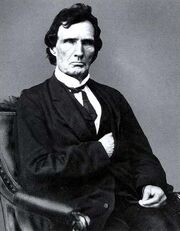| ||||||||||||||||||||||||||||||||||||
Thaddeus Stevens (April 4, 1792 – August 11, 1868), of Pennsylvania, was a Republican Party leader and one of the most powerful members of the United States House of Representatives. Stevens dominated the House from 1861 until his death and wrote much of the financial legislation that paid for the American Civil War. Shortly before his death, he voted for the impeachment of President Andrew Johnson. Historians have criticized Stevens' obsessive, monomaniacal hatred of the Confederate States, but praised his sincere desire for the equality of black people in American society.
Thaddeus Stevens in "Must and Shall"[]
Representative[1] Thaddeus Stevens was an early and vocal supporter of President Hannibal Hamlin's plan for a harsh reconstruction of the South in the post-war years. Even into the 1940s, Stevens' name was closely associated with the continued occupation of the South.[2]
Thaddeus Stevens in The Guns of the South[]
Andries Rhoodie used Thaddeus Stevens's fearsome reputation to his advantage in a falsified version of American history he gave to hide the Rivington Men's true motives. He claimed that Stevens succeeded Abraham Lincoln (who served two full terms) as President and that his hardhearted policies toward the reconstruction of the South allowed black people to gain political, economic, and social advantage over white people that they never relinquished, though he declined to give details. On hearing this falsified history, Robert E. Lee was convinced that the specter of a Confederate defeat would be disastrous indeed.[3]
Lee later learned the truth from a book from the future which Melvin Bean brought to his attention.
References[]
- ↑ See Inconsistencies (Must and Shall).
- ↑ See, e.g., Counting Up, Counting Down, pg. 67
- ↑ The Guns of the South, pgs. 83-4.
| Political offices (OTL) | ||
|---|---|---|
| Preceded by John Strohm |
Member of the U.S. House of Representatives from Pennsylvania's 8th congressional district 1849–1853 |
Succeeded by Henry A. Muhlenberg |
| Preceded by Anthony E. Roberts |
Member of the U.S. House of Representatives from Pennsylvania's 9th congressional district 1859–1868 |
Succeeded by Oliver J. Dickey |
| Preceded by John Sherman |
Chairman of the House Ways and Means Committee 1861–1865 |
Succeeded by Justin Smith Morrill |
| |||||||||||||||||||
| ||||||||

